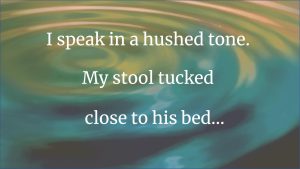Carl V. Tyler
In my clinic and in the nursing home
Every week I see it
That depthless hollow look behind the eyes
But this time it was your eyes
Sitting across the table
At a TGI Friday’s outside of DC.
And that all-too-familiar look to your face
Of knowing and not knowing
Of barely contained panic
Of quizzically furrowed brow
Of fear.
Lost was your rich and subtle language
The rapid-fire musical cadence
The effortless literary allusions
Of English teacher and poet.
We faltered for conversation
Until I found Wallace Stevens on my iPhone
And began to read you his poetry
“Sunday Morning” and “Metaphors of a Magnifico”
You cooed and aahhed and sighed with pleasure.
In those brief sacred moments of poetry
A clarity returned
Your face relaxed
The fear vaporized
Your eyes and mind miraculously renewed.
So ended the last time we saw each other.
The next day I flew home
Greeted in the foyer adorned
By the wedding-gift poem
You penned a quarter-century ago.
Poetry was your mother tongue
And in that inexorable battle against the darkness
The last language to leave you.
About the poet:
Carl V. Tyler Jr. is a physician, medical educator and researcher based at Fairview Hospital/Cleveland Clinic Family Medicine Residency. His published works include The Pronouncement, a story that appeared in Pulse, and the poem “Swept Away,” which appeared in an anthology of poetry about birth in Journal of Medical Humanities. “There is a synergy that ebbs and flows between my writing as a researcher and my creative writing. My impetus to write is strongest while on wilderness canoe trips, during family vacations to the ocean with my wife and three daughters, and in the sacred moments shared with patients, families and caregivers.”
About the poem:
“In my daily work as a family physician/geriatrician, I frequently witness the devastating effects of neurodegenerative diseases on the bodies and minds of elders. My personal experience is of course vastly different when the individual so affected is not a patient but rather a personal friend. ‘First Language’ describes my last encounter with a lifelong friend, Sue Pollitz, who was an English teacher and poet. As we struggled to communicate with each other despite her Alzheimer’s disease, I turned to our shared love of the poet Wallace Stevens as a means to connect and to enjoy our time together, allowing the words of the poet to speak for and soothe both of us.”
Poetry editors:
Johanna Shapiro and Judy Schaefer








5 thoughts on “First Language”
Carl– lovely poem and commentary… hope we can get together again soon to share words! best, mk
The poem flowed. In my mind it was the voyeur’s description of someone skulking, after “the KIng”
and their court. I note a smidgin of envy from the voyeur, as I must.
The King
Excellent! Said a tremendous amount well in a confined space = poetry.
This poem deeply resonated with me, not because of a personal story, but because of its universality. At first, I thought the hollowed eyes belonged to a cancer patient struggling with an untimely demise. The realization that the hollowness was caused by dementia was a twist. This made me realize that there are a multitude of causes of hollowed eyes. Maybe it should be included in the ICD-10?It is a telling physical sign.
Poet Wallace Stevens connection was NEAT, to use a word not so often heard today. Overall I thought the poem worked quite well. Said a lot in a few words, and plainly so, which for me is what a good poem ought to do. Not enough of them do, however.